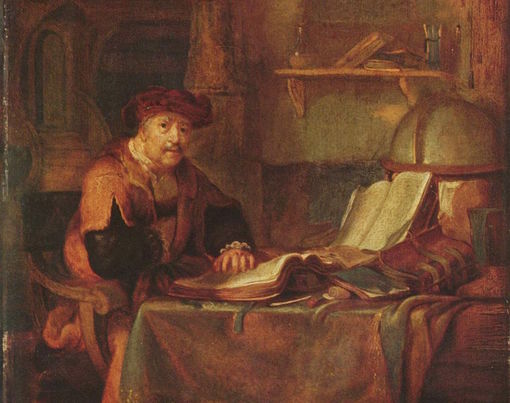
Scholar and His Books by Gerbrand van den Eeckhout – Public Domain
The dictionary defines academic as “educational, scholastic,” as well as “not of practical relevance; of only theoretical interest.” After spending a week at an academic conference with eminent university scholars of international relations, I find it appropriate to question the relationship between the two definitions. Were the scholars and their scholastic writings “not of practical relevance” and “only of theoretical interest”?
The formal study of international relations is a modern discipline. The oldest department in Europe was founded in 1919 at the University of Aberystwyth in Wales. The oldest on the Continent is the Graduate Institute of International Studies in Geneva inaugurated in 1927. The latter was supposed to have an input into the work of the League of Nations and had a long tradition of training Swiss diplomats.
Many of the schools of international relations, or now sometimes called global studies, try to combine research and degree-granting teaching with practical field work to bridge the gap. The Association of Professional Schools of International Affairs (APSIA), for example, has thirty-eight member institutions throughout the world including the John F. Kennedy School of Government at Harvard University and the Moscow State Institute of International Relations (MGIMO). As opposed to traditional academic masters, some APSIA schools offer degrees in public administration or public policy. These professional schools often have former diplomats teaching as adjunct professors.
International Relations is the academic field of international relations. The annual meeting of the International Studies Association, this year in Toronto, was not for diplomats or practitioners – although there were some U.S. State Department officials presenting. The conference was for academics researching and teaching international relations.
What were the scholars interested in? Largely dominated by North Americans, the conference had many panels on the decline of the liberal international order established after 1945. Questions about U.S. isolationism complemented the rise of China as well as the limitations of multilateralism in a world of increasing nationalism.
Right-wing populism was a recurring theme. Rational explanations were given to analyze emotional anti-globalization, including Brexit and growing illiberal democracies in several European countries.
Emotions have become more and more important in scholarly analysis. Following the lead of psychologists such as Daniel Goleman who wrote on emotional intelligence and the Nobel Prize winning behavioral economists Daniel Kahneman, Robert Shiller and Richard Thaler, IR academics are beginning to move away from “rational choice theory” to a more humane analysis of human and state behavior.
Beyond the human, there was a fascination with artificial intelligence. Issues of war and peace have always been determined by people. Now, some asked, what would happen if an artificial intelligence (AI) machine used an algorithm to send drones to attack another country? What would happen if war and peace were determined by non-human actors who suddenly made decisions beyond human control? (On a more policy-oriented note, a recent meeting of experts in Geneva debated the relevance of traditional humanitarian norms for autonomous lethal weapon systems.)
Academics have different interests from practitioners. Publications, tenure and mentoring students are university responsibilities, not responsibilities for governing the world. (It is an open question whether academics sub-consciously want to govern the world. Harvard University has a rule – known as the Kissinger rule – that faculty can only take two years off to do other activities such as government work in Washington. David Halberstam’s The Best and the Brightest is a damning recounting of how the Harvard elite failed to understand the Vietnam War because of its arrogance.)
General theories abound among scholars. Realists, Constructivists, English School, Liberal Internationalists (among others) divide the IR discipline. Great Debates have come and gone; such as the first between Realists and Idealists, the second between Traditionalists and Scientists, and the third between Rationalists and Reflectivists. Iconic texts by Thucydides, Thomas Hobbes, Niccolò Machiavelli, Hedley Bull and Hans Morgenthau are regularly reread, revisited and re-interpreted. New schools of interpretation pop up (“the turn to the aesthetic”), often with very short life spans.
The desire to explain the political world attracts; many young students attended the meeting. But explaining is not understanding, and theory is not practice. The two definitions of academic remain a dividing wall that separates IR from international relations. International Relations remains academic, in both senses of the word.